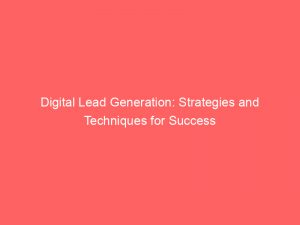- digital lead generation
- The Importance Of Digital Lead Generation
- Utilizing Analytics And Targeting For Effective Lead Generation
- The Roles Of Social Media And Search Engine Marketing
- Direct Response Vs Cold-Calling: Which Is More Effective?
- Understanding Customer Needs And Interests Through Lead Generation
- Creating Opportunities With Qualified Prospects
- B2B And B2C Lead Generation: Key Focus Areas
- The Role Of Lead Nurturing And Personalized Experiences
In today’s fast-paced digital world, businesses are constantly searching for innovative ways to stay ahead of the competition and attract potential customers. One key strategy that has proven to be immensely effective is digitalleadgeneration.
By leveraging targeted marketing, social media platforms, and search engine optimization techniques, businesses can generate a steady stream of qualified leads. These leads can then be converted into loyal customers through the utilization of personalized experiences and a range of methods, including contact forms and email marketing.
Join us as we delve into the world of digital lead generation, exploring the exciting possibilities and strategies that can help businesses thrive in the digital age.
| Item | Details |
|---|---|
| Topic | Digital Lead Generation: Strategies and Techniques for Success |
| Category | Digital Marketing |
| Key takeaway | In today's fast-paced digital world, businesses are constantly searching for innovative ways to stay ahead of the competition and attract potential customers. |
| Last updated | December 27, 2025 |
digital lead generation
Digital lead generation refers to the process of attracting and capturing potential customers through online marketing strategies. It is an essential aspect of digital marketing for businesses as it allows them to target specific audiences and analyze their interests using analytics software.
Social media and search engine marketing play a vital role in driving traffic to a business’s website and converting visitors into leads. Direct response lead generation is proven to be more effective than traditional cold-calling methods.
Businesses rely on lead generation to gain insights into their potential customers’ needs and preferences. Lead nurturing and personalized experiences are crucial for converting leads into customers.
Different types of leads, such as marketing qualified leads and sales qualified leads, are discussed in the context of B2B and B2C lead generation. Various methods, such as contact forms, referrals, social media, and newsletter subscriptions, are used to generate leads.
Implementing lead generation marketing methods like content with call-to-actions, email marketing, paid ads, and remarketing further enhances the chances of attracting qualified prospects. Overall, digital lead generation is a key strategy for businesses to attract and convert potential customers online.Key Points:
- Digital lead generation is the process of attracting and capturing potential customers through online marketing strategies.
- Social media and search engine marketing are important for driving traffic to a business’s website and converting visitors into leads.
- Direct response lead generation is more effective than traditional cold-calling methods.
- Lead nurturing and personalized experiences are crucial for converting leads into customers.
- Different types of leads, such as marketing qualified leads and sales qualified leads, are discussed in the context of B2B and B2C lead generation.
- Implementing strategies like content with call-to-actions, email marketing, paid ads, and remarketing enhances the chances of attracting qualified prospects.
Sources
https://www.forbes.com/advisor/business/online-lead-generation/
https://leadgenera.com/knowledge-hub/lead-generation/what-is-lead-generation-in-digital-marketing/
https://www.coursera.org/articles/lead-generation
https://dynamics.microsoft.com/en-us/marketing/what-is-lead-generation/
Check this out:
💡 Pro Tips:
1. Optimize landing pages: Ensure that your landing pages are visually appealing, easy to navigate, and optimized for conversions. Use persuasive copy and compelling call-to-actions to encourage visitors to take action and become leads.
2. Use lead magnets: Offer valuable content such as free e-books, guides, or webinars in exchange for visitors’ contact information. This will entice them to provide their details and become leads, allowing you to follow up with them later.
3. Leverage customer testimonials: Social proof is a powerful tool in lead generation. Display testimonials and reviews from satisfied customers on your website to build trust and credibility. This can help convert website visitors into leads.
4. Implement live chat: Incorporating live chat functionality on your website can engage visitors in real-time and provide immediate assistance. This personal interaction can increase the likelihood of capturing leads or qualifying potential customers for further nurturing.
5. Use content upgrades: Enhance the value of your blog posts by offering content upgrades related to the topic. For example, if the blog post is about email marketing, offer a downloadable checklist or template that visitors can access by providing their email addresses. This strategy can significantly increase lead capture.
The Importance Of Digital Lead Generation
In the world of digital marketing, lead generation holds a crucial role for businesses looking to attract potential customers. It serves as the foundation of successful marketing campaigns, allowing businesses to identify and engage with individuals who have shown interest in their products or services.
By capturing leads, businesses can nurture relationships, build trust, and ultimately convert them into valuable customers.
Utilizing Analytics And Targeting For Effective Lead Generation
One of the key elements of successful lead generation in the digital space is the use of analytics software. By leveraging data, businesses can gain valuable insights into their target audience’s behavior, preferences, and needs.
This information helps drive targeted marketing efforts, allowing businesses to tailor their messaging and offerings to resonate with their potential customers.
In addition to analytics, targeting specific audiences is another effective strategy for generating leads. By identifying and focusing on individuals who are more likely to be interested in a business’s products or services, companies can optimize their marketing efforts and increase the chances of attracting qualified leads.
The Roles Of Social Media And Search Engine Marketing
Social media and search engine marketing play vital roles in the process of lead generation. Social media platforms provide businesses with an effective channel to reach and engage with users who may be interested in their offerings.
Through targeted advertising, businesses can display their content to individuals who fit their target audience criteria, increasing the chances of capturing leads.
Search engine marketing, on the other hand, allows businesses to tap into the massive user base of search engines to generate leads. By optimizing their websites and content to appear in relevant search results, businesses can attract individuals who are actively searching for products or services similar to what they offer.
Direct Response Vs Cold-Calling: Which Is More Effective?
When it comes to lead generation, direct response methods have proven to be more effective than traditional cold-calling approaches. Cold-calling typically involves reaching out to individuals who may not have shown any prior interest in a business’s offerings.
This method often leads to a low conversion rate and can be time-consuming.
Direct response lead generation, on the other hand, focuses on engaging with individuals who have already expressed interest or interacted with a business in some way. This can include individuals who have signed up for newsletters, filled out contact forms, or visited the company’s website.
By targeting these warm leads, businesses can increase the likelihood of converting them into customers.
Understanding Customer Needs And Interests Through Lead Generation
Lead generation not only helps businesses capture potential customers but also provides valuable insights into their needs and interests. By analyzing the data collected during the lead generation process, businesses can gain a deeper understanding of what their potential customers are looking for.
This information can then be used to tailor marketing messaging, develop targeted offerings, and improve overall customer experience.
Creating Opportunities With Qualified Prospects
Lead generation creates opportunities for businesses to attract and engage with qualified prospects. By capturing leads, businesses can nurture relationships, provide valuable information, and showcase the benefits of their products or services.
This ongoing engagement with potential customers helps build trust, positions the business as an authority in their industry, and increases the chances of conversion.
B2B And B2C Lead Generation: Key Focus Areas
Lead generation strategies can vary depending on whether the target audience is in the business-to-business (B2B) or business-to-consumer (B2C) sector. B2B lead generation often involves building relationships with other businesses and decision-makers who have a greater impact on purchasing decisions.
On the other hand, B2C lead generation focuses on capturing the attention of individual consumers and appealing to their needs and desires.
New optimization ideas included — stay ahead.
Both B2B and B2C lead generation require businesses to understand their target audience, tailor marketing efforts accordingly, and provide personalized experiences to increase the chances of conversion.
The Role Of Lead Nurturing And Personalized Experiences
Lead nurturing is an essential component of successful lead generation. Once leads are captured, businesses must invest time and effort into building relationships and providing value to potential customers.
This can be done through personalized experiences, such as customized emails, targeted content, and tailored recommendations.
By nurturing leads, businesses can gradually move them through the sales funnel, providing the information and support they need to make informed purchasing decisions. This ongoing engagement helps build trust, establishes credibility, and positions the business as a valuable resource in the eyes of potential customers.
In conclusion, digital lead generation is a crucial aspect of any successful marketing strategy. By utilizing analytics, targeting specific audiences, leveraging social media and search engine marketing, focusing on direct response techniques, understanding customer needs, creating opportunities with qualified prospects, and implementing lead nurturing efforts, businesses can increase their chances of attracting potential customers and driving conversions.
With the right strategies and techniques in place, businesses can thrive in the competitive digital landscape.
Self-Serve DSP Platform • Advertising Platform for Marketers • Native Ad Network











